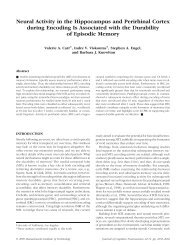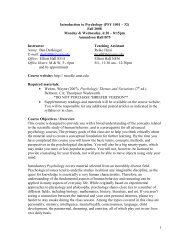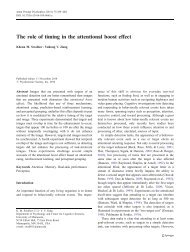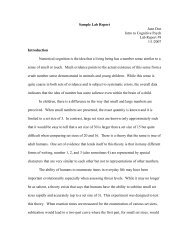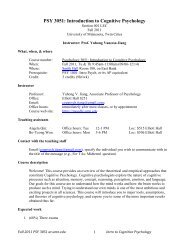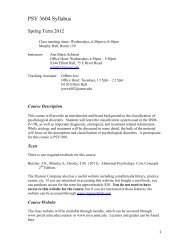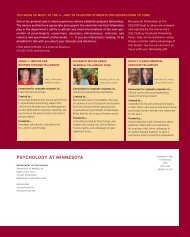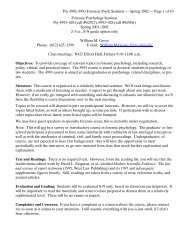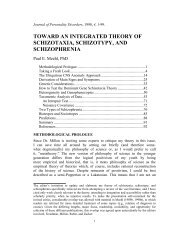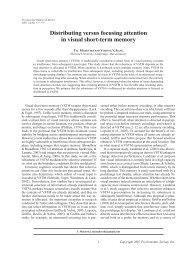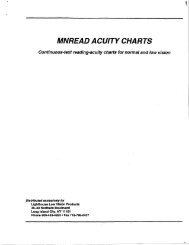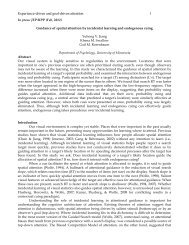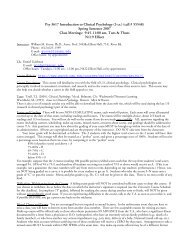Psy 3604: Abnormal Psychology
Psy 3604: Abnormal Psychology
Psy 3604: Abnormal Psychology
Create successful ePaper yourself
Turn your PDF publications into a flip-book with our unique Google optimized e-Paper software.
000129 PSYC 300 §01 <strong>Abnormal</strong> <strong>Psy</strong>chology (4 cr.) Summer 2005<br />
Class Meetings: 6:00–9:20 p.m. Wednesday Midway Room 34<br />
Instructor: William M. Grove, Ph.D., Assoc. Professor (U. of Minnesota)<br />
Office: N438a Elliott Hall, 75 East River Road, Minneapolis MN 55455–0344<br />
E-mail: grove001@umn.edu<br />
Office hours: by appointment<br />
Phone: (612) 625–1599 office; (651) 578–8004 home (don’t call between 2:30 a.m.-7:00 a.m., please)<br />
Course Description<br />
This course will provide a broad survey of various aspects of abnormal behavior. Emphasis will be placed on an empirical view.<br />
The bulk of the course will cover the various categories of adult and child psychopathology. The lectures will focus primarily on a<br />
description of various forms of psychopathology. Diagnosis, epidemiology, research on etiology, laboratory test abnormalities, and<br />
treatment will be considered as they relate to specific disorders.<br />
Competence Statement<br />
Understands descriptive psychopathology, epidemiology of mental disorders, and etiological research on mental disorders at an<br />
introductory level.<br />
Learning Objective #1 Understands and can recall DSM-IV and related diagnostic criteria for common and/or serious mental<br />
disorders of adult and childhood onset, as shown on midterm and final examinations.<br />
Learning Objective #2 Knows other basic descriptive psychopathology information, such as associated features, for these<br />
mental disorders, as shown on midterm and final examinations.<br />
Learning Objective #3 Understands and can recall basic information about epidemiology (general population prevalence, age of<br />
onset distribution, sex ratio, and risk factors) regarding disorders, as shown on midterm and final examinations.<br />
Learning Objective #4 Understands and can recall basic information regarding etiological research (biological factors,<br />
psychosocial factors, and their interactions) regarding these mental disorders, as shown on midterm and final examinations.<br />
Prerequisite<br />
PSYC 100 General <strong>Psy</strong>chology, or equivalent with instructor’s consent.<br />
Format<br />
Integrated lecture and discussion. Lectures will not simply repeat what’s in the readings (but repeating in lecture what you read in a<br />
text is a good clue that something come up on an exam). Please interrupt me frequently to get me to slow down (I try to watch it,<br />
but I tend to speak rapidly), to ask questions, or to debate my sometimes-dubious pronouncements. There is no such thing as a<br />
stupid question. If something I say is not clear to you, or it’s implausible, chances are good that I haven’t explained things well<br />
enough or I’ve made a mistake. Everyone is likely to benefit from hearing your question or counter-argument, and I will try to<br />
ensure my answer is clear, informative, and well grounded in scientific research. I would rather cover fewer items of information,<br />
with more good discussion and comprehension, than simply whiz through reams of information with the class sitting before me in a<br />
silent daze.<br />
Required Reading<br />
Davison, G.C., & Neale, J.M. (2000). <strong>Abnormal</strong> <strong>Psy</strong>chology, 8th ed. NY: Wiley. (Note: Study aids are at<br />
http://www.wiley.com/college/bcs/0471318116/wave_s.html.)<br />
Exams and Grading<br />
There will be two exams, each with 60 questions. The midterm exam will address all material covered up to that point, including<br />
readings, lectures, and discussion. The final exam will cover only material covered after the midterm. The exams will be multiple<br />
choice, about 2/3 based on readings and 1/3 on lecture/discussion. You will not do well on the exams if you do not study very<br />
carefully. ALL questions regarding the exams (including content, scheduling, make-up exams, missed exams, concerns about scores,<br />
and grading) should be addressed to me. Any questions you may have about the grading of your exam MUST be brought up<br />
within three weeks of the date of its administration. All tests contain copyrighted material; do not take tests from the classroom.
PSYC 300 Sect. 01 <strong>Abnormal</strong> <strong>Psy</strong>chology — Summer Session I 2004 Page 2 of 3<br />
Your letter grade will be determined as follows: The 3 students with the highest total scores on the two exams will have their scores<br />
averaged (the median is taken). This average will then be treated as a “perfect” score, and equated to a percentage score of 100%.<br />
Students will receive a percentage score based on their raw score, by comparing it to the “perfect” score and rounding (if necessary)<br />
to the nearest higher whole percent:<br />
85% (of perfect score) and above = A<br />
75–84% = B<br />
65–74% = C<br />
55–64% = D<br />
54% and below = F.<br />
For example, suppose that the 2 exams (totaling 120 possible points) yielded scores such that the top three students’ total scores are<br />
118, 104, and 102—an average of 108. 85% of 108 is 91.8, which rounds to 92. Therefore all students receiving test totals of 92<br />
or above would receive an A. (This is an example, not a guarantee; the exact numbers will vary from term to term, depending on<br />
students’ performances.) Hence, you are NOT being graded on a curve; it is possible for every student to get an A. Students who<br />
take the course Pass/Fail must earn a grade of “C” or higher to pass the course. Minus and plus grades (e.g., B+, C–) will not be<br />
given. There is no extra credit of any kind. I reserve the right to adjust the given cut points downward, so as to improve student<br />
grades; cut points will never be adjusted in a manner that lowers anybody’s grade.<br />
Difficulties; Withdrawing from the Course<br />
If you need to withdraw, try hard to do so while you can still request a tuition refund (according to the Metro State academic<br />
calendar, this is May 16, I believe); the deadline for withdrawing without a refund is (again according to the calendar) June 5, I<br />
believe. Incompletes (“I” grades) will NOT be given except under very limited circumstances. If you are experiencing difficulties in<br />
the course, talk to the instructor as soon as you realize it, and if at all possible BEFORE you get a low test score. I will work hard<br />
with you to help you do well in this course, including answering questions by phone or e-mail, talking with you before or after class,<br />
attending group study/review sessions outside of class scheduled time, and meeting with you for individual tutoring (as needed and<br />
within reason).<br />
Missed Classes and Exams<br />
You are not required to attend classes. However, it is to your advantage to do so. For one reason, interesting points frequently<br />
come up in discussions, which end up on an exam. In you have to miss a class, borrow notes from another class member; please<br />
don’t ask me to copy notes/overheads for you. I will e-mail electronic copies of overheads (in Microsoft PowerPoint format) to<br />
students if they wish, all bundled together for the whole course. Note: these are quite bulky, and not all e-mail servers will accept<br />
such large e-mails. CD copies of all materials (syllabus, PowerPoint slides, etc.) will be provided to students if they give me a blank<br />
CD.<br />
There are FEW acceptable reasons for missing an exam. Make-up exams will be offered only to those who obtain my permission<br />
IN ADVANCE, or who have a significant illness documented by a letter from a licensed health care provider, or have an extremely<br />
serious family problem (e.g., death of a family member) or have another very serious and unavoidable impediment (e.g., jury duty,<br />
delivery of a baby, National Guard call-up, etc.). Students who miss an exam without satisfying one of these conditions will receive<br />
a ZERO for that exam. Arrangements to take a missed exam MUST be made within ONE WEEK of the exam date. Any make-up<br />
exams offered may be of a different format than the in-class exam, e.g., they may have oral or essay questions. Missed make-up<br />
exams will be scored as ZERO, and will NOT be rescheduled. THERE ARE NO EXCEPTIONS TO THE POLICIES STATED<br />
HERE.<br />
Student Conduct Code (see http://www.metrostate.edu/handbook/text.html, heading “Community Conduct Code”)<br />
The code states: “Individuals are expected to be honest in meeting their academic obligations. Violation examples: cheating on<br />
assignments or examinations; plagiarizing; altering, forging or misusing university academic records; and using tests or other<br />
materials without permission. Possible sanctions: warning, course failure or grade change, probation, suspension or expulsion.”<br />
The instructor will strictly enforce this code with regard to examinations. Note: this course only has examinations; there are no<br />
homework assignments, papers to write, etc.<br />
Topical Schedule of Class Sessions<br />
On the next page is the tentative topic schedule for each class session, with reading assignments. Readings from Davison & Neale<br />
are given as “Ch 2,” etc. When a section or sections of a chapter, rather than the chapter entire, are to be read, the sections are<br />
identified by “Section Title” and the like.
PSYC 300 Sect. 01 <strong>Abnormal</strong> <strong>Psy</strong>chology — Summer Session I 2004 Page 3 of 3<br />
Topic Schedule for Class Sessions<br />
Week Date Topic Readings<br />
1 May 11 History; Research Methods; Classification Ch 1; Ch 2 “Biological Paradigm,”<br />
“Learning Paradigms,” “Cognitive<br />
Paradigm”; Ch 3; Ch 4 “Reliability<br />
and Validity in Assessments,”<br />
“<strong>Psy</strong>chological Assessments,<br />
“Cultural Diversity and Clinical<br />
Assessment,” “The Consistency and<br />
Variability of Behavior”; Ch 5<br />
2 May 18 Mood (Affective Disorders) Ch 10<br />
3 May 25 Schizophrenia Ch 11<br />
4 June 1 Anxiety Disorders Ch 6<br />
5 June 8 Somatoform Disorders Ch 7 “Somatoform Disorders”<br />
6 June 15 Substance-Related Disorders Ch 12



